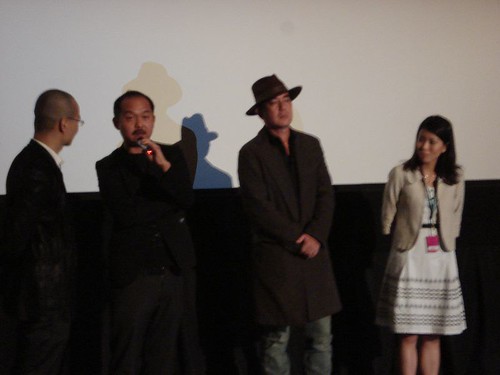dleedlee wrote:Glad to hear John's endorsement of OCEAN FLAME. And surprised, too. I recall only a tepid response from the Cannes screening. Just goes to show you.
Having now seen it, I'm not sure I can share that endorsement, despite its technical proficiency. But I think I'm naturally biased against movies about unpleasant characters beating and hating each other until they practically die (more or less). I think the BAD GUY comparison is apt, but that's a better film (though no less brutal in its way), and perhaps its somewhat ambiguous ending was what allowed me to draw my own conclusions. OCEAN FLAME takes that core relationship--in this case an emotionally cross-wired waitress inexplicably and violently attracted to a hot-wired mainland hood who does little but screw her, beat her, cause her to abort their baby, and ultimately marry her off to his partner-in-blackmail-schemes. She hates him, she loves him, she hates him, she loves him, she thinks she can change him but baby, you oughta
know you can't do that. Mostly she hates him, but they have sex while ocean waves thunder across the soundfield and the audience titters, and later they have violent kitchen sex while a fried egg gets fried into oblivion on a nearby pan, and the audience titters some more.

I know these kinds of irredeemably unpleasant characters fascinate filmmakers (especially young ones) the world over--and I'm sure I've seen similar tales from other countries--but I can't really remember a movie where I felt they could exist in real life. BAD GUY came the closest I suppose, and I think that may have been due in part to the fact that the "heroine" such as she is, starts off as one of us, and her dirty little secret (thievery) gets her into a whole mess of trouble, and her forcible confinement somewhat explains the attraction she develops for her captor. In OCEAN FLAME, we barely
know the female lead before she becomes smitten with this scuzzy looking rogue who, with an excited grin on his face, braves a thrashing at the hands of gangster Lam Suet, and logically, she could walk away any time (and does, briefly). Ooooh, how nihilistic. I'm also not sure why this was set in Hong Kong beyond the fact it probably wouldn't have gotten a greenlight on the mainland, and the director could score a handful of familiar locals in tiny key roles. On a technical level, it's good stuff, but these characters are so predictable they're practically types at this point. After about 30 minutes, I knew exactly how the two leads would end up (if not the exact methods); you can just feel it coming because the genre practically demands it, and the director apparently didn't want to challenge convention.
Intrigued, but unfamiliar with the whole WINDS OF SEPTEMBER series. What is the link between the three films (Taiwan/HK/China)? Is it thematic, historical or something else?
Can't remember exactly, but I recall the director saying that the Hong Kong edition will be at least partly based on stories submitted to the production by young people in the city or something like that. The first film ends in 1997, so I was tempted to ask if the Hong Kong story would start in that year, and maybe the mainland Chinese story at a later time of significance, but never got the chance. Might be interesting. Eric Tsang's involvement in the film came in a roundabout way: his daughter who lives in Taiwan actually noticed Lin's earlier short film THE PAIN OF OTHERS and met him for coffee to discuss a feature. Lin, who's fluent in English, also suggested that this film is about 80% autobiographical, and that the single film that inspired him to become a filmmaker was Edward Yang's A BRIGHTER SUMMER DAY. He also said he harbors a grave outlook for the future of the Taiwanese film industry, which is probably not surprising.



